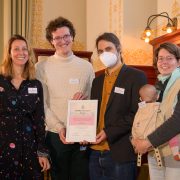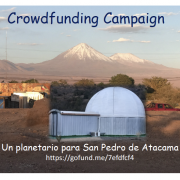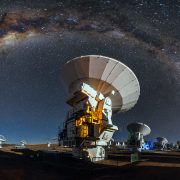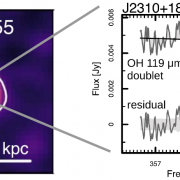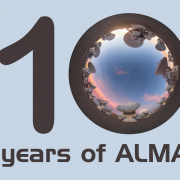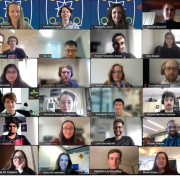Sixth European ALMA Regional Centre community assembly
/in Allegro, ALMA, European ARC, General news, Newsletter March 2023/by AllegroThe Sixth European ALMA Regional Centre community assembly meeting will take place virtually on the 17th of April at 11:00 CEST and can be accessed via this Microsoft Teams link. During the meeting, staff from the European ALMA Regional Centre will present updates on ALMA Cycle 10, in particular the procedures for Joint Proposals with other facilities including the European Southern Observatory’s Very Large Telescope, the Space Telescope Science Institute’s James Webb Space Telescope, and the National Radio Astronomy Observatory’s Karl G. Jansky Very Large Array. In addition, you will hear about the new capabilities offered in Cycle 10, including ALMA Band 1, and the support that the European ARC network offers the community.
Crowdfunding campaign to establish a planetarium in San Pedro de Atacama
/in Allegro, ALMA, General news, Newsletter March 2023/by AllegroFormer ALMA director, Thijs de Graauw, and the Fondacion “Planetarios Educativos para Chile” have launched a crowdfunding campaign to construct and operate a public planetarium in San Pedro de Atacama, ALMA’s host community. This provides the opportunity to include the people of San Pedro de Atacama in the celebrations of 10 years of ALMA science operations, and express appreciation for the Licanantai communities upon whose sacred lands the ALMA Observatory is situated. The planetarium will open the ALMA universe for this local community, and will provide a window to the world of science and technology for schools and colleges that will help inspire young people to learn and participate in the STEM fields.
For more information and to donate, visit https://gofund.me/7efdfcf4
ALMA Cycle 10 proposal preparation workshop
/in Allegro, ALMA, General news, Newsletter March 2023/by AllegroThe Allegro ALMA Regional Centre node is organising a proposal preparation workshop on the 20th of April 2023 in advance of the upcoming ALMA proposal deadline (expected to be the 10th of May 2023). The workshop will have two sessions: In the morning there will be an introduction to writing and preparing ALMA proposals for new users. In the afternoon there will be a summary of new features and changes in Cycle 10 for experienced users as well as the attendees of the morning session. You are welcome to attend online or in person at Leiden Observatory. For more information about the workshop, visit the workshop website. Registration deadline is April 13, 2023.
In addition to this proposal preparation day, you can request a meeting with the Allegro staff to discuss your proposal or come to our drop-in sessions (April 24, May 1, and May 8 at HL-1122 from 14:00-16:00). We especially encourage anybody who is considering submitting a Large Programme to contact us at Allegro early so that we can explore the many ways we can support your project and help optimise your program.
If you want to get a head start on thinking about writing an ALMA proposal, Allegro’s Program Manager Violette Impellizzeri gave a presentation last year, available to view as a YouTube video, about writing and reviewing ALMA proposals. It includes guidelines for writing dual anonymous proposals and useful tips and tricks.
More about Cycle 10:
It is expected that antenna configurations C-1 to C-8 will be available in Cycle 10. There will also be several new capabilities offered by ALMA in this cycle, including the new ALMA Band 1 and the new availability of joint proposals with JWST, the VLA and the VLT. For more information about the expected dates and what will be on offer in Cycle 10, please see the ALMA Cycle 10 Pre-announcement.
Science highlight: Tracing galaxy mass loss via OH absorption at high redshift
/in Allegro, ALMA, General news, Newsletter March 2023/by AllegroMass loss from high-redshift galaxies is crucial in quenching star formation and enriching the intergalactic medium. Only limited information is available on the gas mass loss of galaxies at z>6. Using ALMA observations of OH 119 μm doublet toward a small sample of high-redshift unobscured QSO host galaxies, Butler et al. (2023, ApJ 944, 134) trace the outflows blueshifted absorption. Estimating the mass loss rate, the authors conclude that the mass loss is likely driven by star formation alone, with only a small contribution from the AGN. Viewing geometry and coverage factor are important factors in the interpretation of the absorption lines and inference of the mass loss rates. Higher resolution follow-up observations with ALMA, and data on a larger sample, will further strengthen the presented results. This work included contributions from astronomers from Leiden, Delft, Heidelberg and Bologna.
Above Figure: ALMA continuum (left) and OH absorption (right) observations of one of the unobscured QSO host galaxies studied by Butler et al. (2023). Blueshifted OH 119 μm absorption traces star-formation driven mass-loss from this z=6 galaxy.
10 years of ALMA science operations
/in Allegro, ALMA, General news, Newsletter March 2023/by AllegroMeeting of ALMA Young Astronomers 2023
/in Allegro, ALMA, European ARC, General news, Newsletter March 2023/by AllegroMarch 10th marked the successful completion of the second Meeting of ALMA Young Astronomers, MAYA 2023. The goal of MAYA is to provide a platform where early career astronomers can present their recent ALMA work, and to facilitate new collaborations and projects through the interaction with other participants and staff working in the ARC nodes.
Work presented at MAYA showcased some of the most exciting research done by early-career astronomers who are interested in ALMA. This week-long virtual conference included participants from around the world who gave talks on topics ranging from protoplanetary disks to high redshift galaxies. The conference had a total of 192 registrants, with 69 abstracts submitted. There were 51 talks on the final MAYA 2023 program, and the majority of these talks have been recorded and will be available shortly on the YouTube channel of the European ALMA Regional Centre Network. The full program can be found on the MAYA 2023 webpage, along with an abstract booklet, and PDFs of the three invited talks (Astronomer on Duty, the ALMA Science Archive, and the Future of ALMA).

